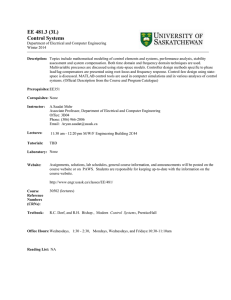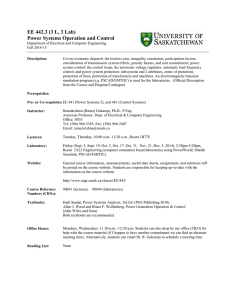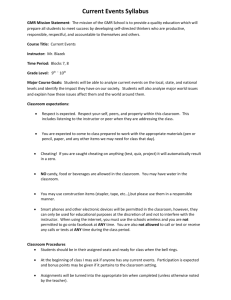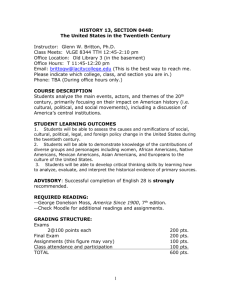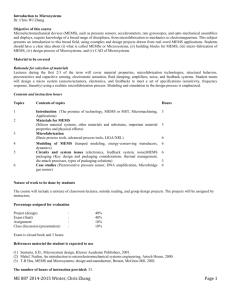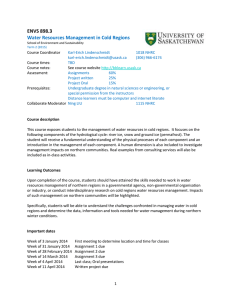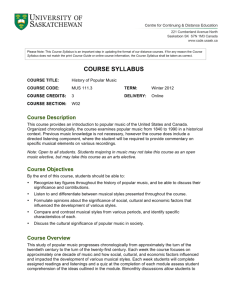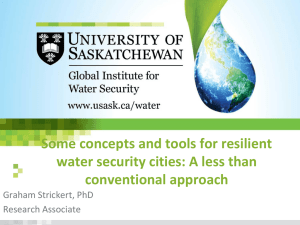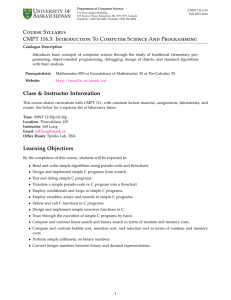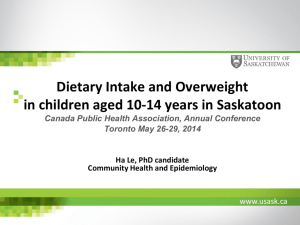Course hand out
advertisement
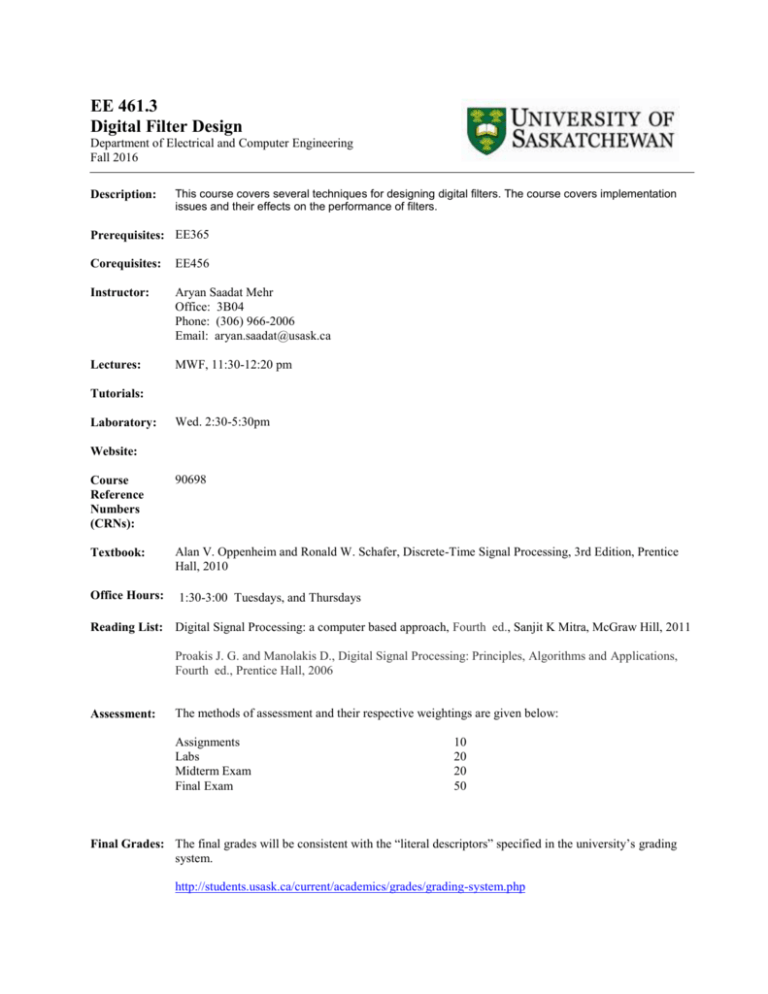
EE 461.3 Digital Filter Design Department of Electrical and Computer Engineering Fall 2016 Description: This course covers several techniques for designing digital filters. The course covers implementation issues and their effects on the performance of filters. Prerequisites: EE365 Corequisites: EE456 Instructor: Aryan Saadat Mehr Office: 3B04 Phone: (306) 966-2006 Email: aryan.saadat@usask.ca Lectures: MWF, 11:30-12:20 pm Tutorials: Laboratory: Wed. 2:30-5:30pm Website: Course Reference Numbers (CRNs): 90698 Textbook: Alan V. Oppenheim and Ronald W. Schafer, Discrete-Time Signal Processing, 3rd Edition, Prentice Hall, 2010 Office Hours: 1:30-3:00 Tuesdays, and Thursdays Reading List: Digital Signal Processing: a computer based approach, Fourth ed., Sanjit K Mitra, McGraw Hill, 2011 Proakis J. G. and Manolakis D., Digital Signal Processing: Principles, Algorithms and Applications, Fourth ed., Prentice Hall, 2006 Assessment: The methods of assessment and their respective weightings are given below: Assignments Labs Midterm Exam Final Exam 10 20 20 50 Final Grades: The final grades will be consistent with the “literal descriptors” specified in the university’s grading system. http://students.usask.ca/current/academics/grades/grading-system.php For information regarding appeals of final grades or other academic matters, please consult the University Council document on academic appeals. http://www.usask.ca/university_secretary/honesty/StudentAcademicAppeals.pdf Course Content: -Sampling and quantization, discrete time processing of continuous time signals - Analysis of filters: All pass, minimum-phase and generalized linear phase systems -Windowing effects in FIR filters -least squares methods in FIR filter design -Design of up-samplers -Quantization effects in IIR filter design -Implementation issues for FIR and IIR filters - Applications in image processing Assignments: Student Conduct: Weekly assignments are to be given and are due the following week by 4:00 pm; please drop your assignments in the EE 461 Assignment Box. Please note that late assignments will not be accepted unless a legitimate reason (illness, religious conviction, etc.) exists and is discussed with the instructor. Solutions to the assignments will be prepared by the instructor, but your assignments will be marked by TAs. Solutions will be available on the course web-site. The lowest mark obtained in the assignments will not be affecting your final marks. Ethical behaviour is an important part of engineering practice. Each professional engineering association has a Code of Ethics, which its members are expected to follow. Since students are in the process of becoming Professional Engineers, it is expected that students will conduct themselves in an ethical manner. The APEGS (Association of Professional Engineers and Geoscientists of Saskatchewan) Code of Ethics states that engineers shall “conduct themselves with fairness, courtesy and good faith towards clients, colleagues, employees and others; give credit where it is due and accept, as well as give, honest and fair professional criticism” (Section 20(e), The Engineering and Geoscience Professions Regulatory Bylaws, 1997). The first part of this statement discusses an engineer’s relationships with his or her colleagues. One of the ways in which engineering students can demonstrate courtesy to their colleagues is by helping to maintain an atmosphere that is conducive to learning, and minimizing disruptions in class. This includes arriving on time for lectures, turning cell phones and other electronic devices off during lectures, not leaving or entering the class at inopportune times, and refraining from talking to others while the instructor is talking. However, if you have questions at any time during lectures, please feel free to ask (chances are very good that someone else may have the same question as you do). For more information, please consult the University Council Guidelines for Academic Conduct. http://www.usask.ca/university_secretary/council/reports_forms/reports/guide_conduct.php Academic Honesty: The latter part of the above statement from the APEGS Code of Ethics discusses giving credit where it is due. At the University, this is addressed by university policies on academic integrity and academic misconduct. In this class, students are expected to submit their own individual work for academic credit, properly cite the work of others, and to follow the rules for examinations. Academic misconduct, plagiarism, and cheating will not be tolerated. Copying of assignments and lab reports is considered academic misconduct. Students are responsible for understanding the university’s policies on academic integrity and academic misconduct. For more information, please consult the University Council Regulations on Student Academic Misconduct and the university’s examination regulations. http://www.usask.ca/university_secretary/honesty/StudentAcademicMisconduct.pdf http://www.usask.ca/university_secretary/council/academiccourses.php Safety: The APEGS Code of Ethics also states that Professional Engineers shall “hold paramount the safety, health and welfare of the public and the protection of the environment and promote health and safety within the workplace” (Section 20(a), The Engineering and Geoscience Professions Regulatory Bylaws, 1997). Safety is taken very seriously by the Department of Electrical and Computer Engineering. Students are expected to work in a safe manner, follow all safety instructions, and use any personal protective equipment provided. Students failing to observe the safety rules in any laboratory will be asked to leave.
